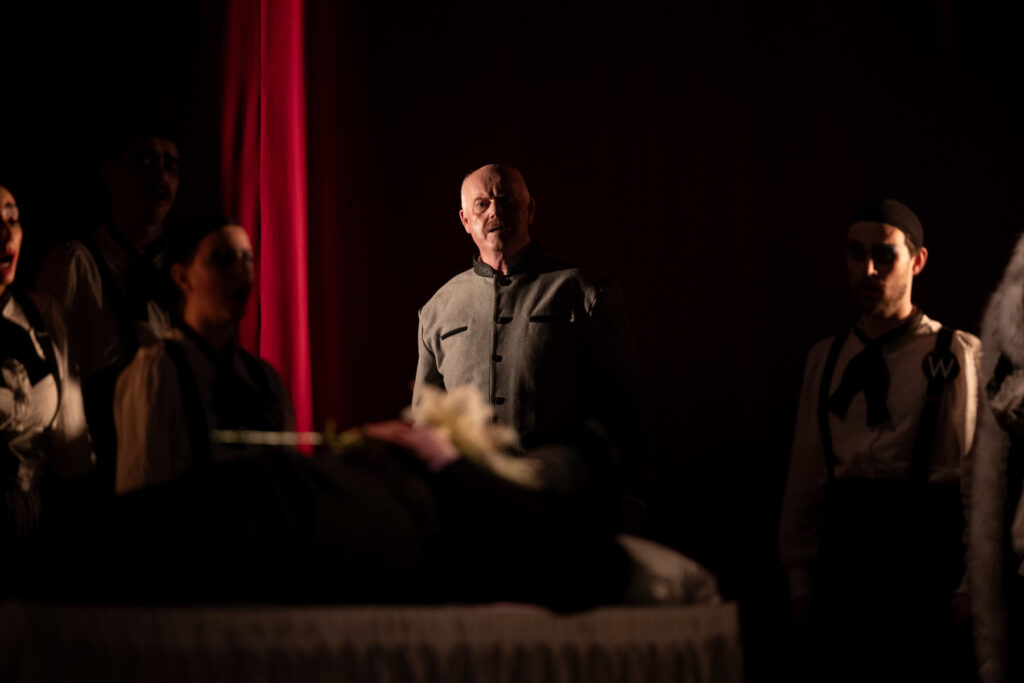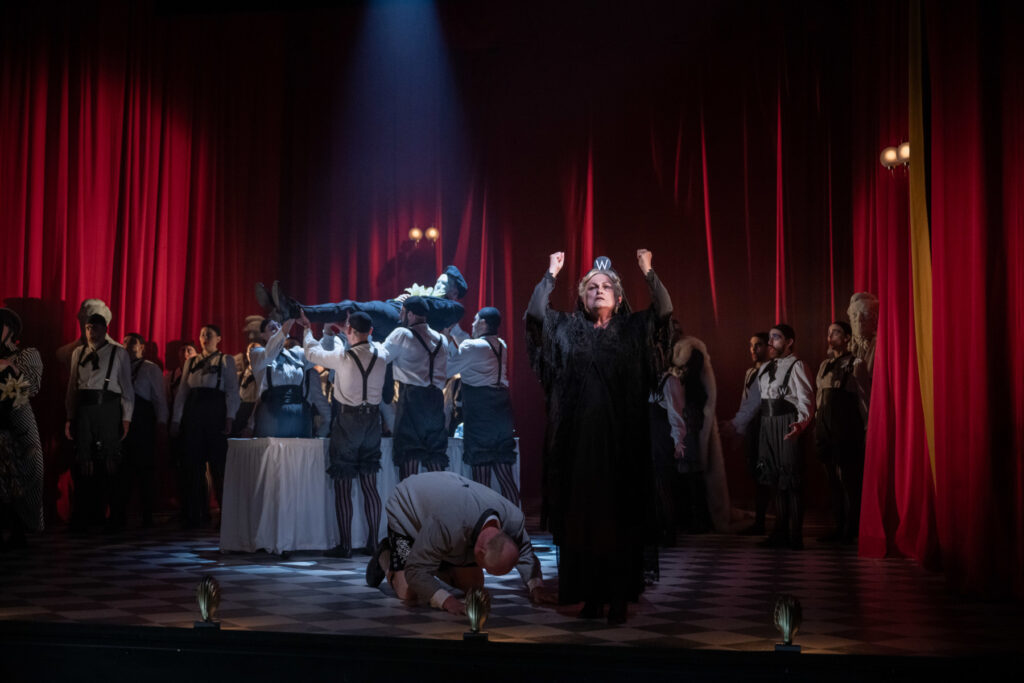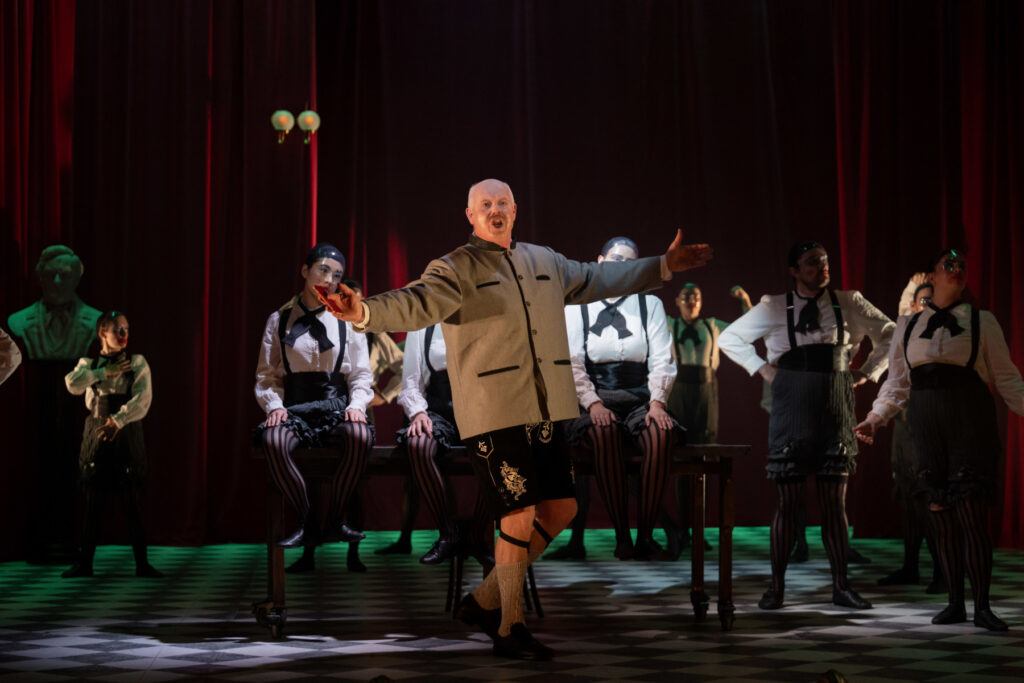The matter of Wagner’s antisemitism – or, more to the point, whether it permeates his work, and its influence upon subsequent German cultural and social history – is a debate likely to last as long as his operas are performed and admired. Anver Dorman’s Wahnfried (premiered at Karlsruhe in 2017 and given its UK premiere here) is more to do with the composer’s legacy after his death, and how his widow Cosima, with the help of the peculiar English philosopher and race theorist Houston Stewart Chamberlain, constructed the idea or even myth of the Master of the Bayreuth, in conjunction with the rise of German nationalism, down to the advent of Hitler in the late 1920s. Discussions about that complex legacy needn’t be rehearsed here, suffice to say that the thesis of the composer’s direct influence upon the fascist movement and the Führer’s programme for the Third Reich was extensively assessed in Joachim Köhler’s book Wagner’s Hitler, but has been largely dismissed as a serious academic argument by various prominent historians of 20th century Germany.

Nevertheless, opera is not historical interpretation or documentary; but, as art, it reserves the autonomy to depict wider truths in concentrated and imaginative form, just as film director Hans-Jürgen Syberberg poetically drew connections between Wagner and the currents of German history after him in his version of Parsifal and Our Hitler. Wahnfried also doesn’t present the development of the Wagner cult as a historically accurate or realist drama but sardonically as a vaudeville or burlesque with the clownish troupe of Wagnerian acolytes goading on the principal characters. Like Cabaret mixed with a Ken Russell film, it irresistibly dissects with some luridness their psychological motivations against the background of a grimly teleological account of a particular historical period. Those characters’ inner drives are not sex or religion, however, but feelings of difference and otherness, which cause Cosima and Chamberlain to seek groundedness and meaning in their lives, even as they turn their insecurity outwards into a deplorable prejudice against Jews. There is a quasi-religious tendency in their seeking a redeemer to save the institution of Bayreuth – and by extension the Germanic, Aryan race – which evidently echoes in perverted form the idea of Parsifal. Chamberlain is welcomed into the circle, and his Social Darwinist writings receive the approval of the Kaiser. But the real saviour is later assumed to be the young soldier – that is to say, Hitler – who appears at the Wagners’ house, asserting his reverence of the Master’s works and his vision for a regenerated society. Borrowing the name of that famous house in Bayreuth (Wahnfried – ‘freedom from delusion’) for the opera’s title serves as a pointed irony for all the characters’ hopes and actions.
The reputation of Wagner himself, or at least his work, is salvaged by having him transformed after his death into a mischievous daemon clad in a bright green suit, rather than an actively evil demon (though he does have something of the character of a Mephistopheles). In Oskar McCarthy’s amusingly frenzied performance, he slithers around the stage, rather defying the expectations and ideas that his disciples have about him, and reminds Chamberlain in the latter’s dying vision that his heroes all ultimately fall in tragedy and that Chamberlain himself is merely a footnote in history. Although the Wagner Daemon leads the young Hitler on with the theme of Tannhäuser on a music box keyboard, he appears to withdraw in consternation at the vision of a reformed Germany expressed, and that his refined distillations of the essence of Greek tragedy in his operas will be used to such vain ends.

Mark Le Brocq brilliantly articulates Chamberlain’s struggling, insecure search for meaning, not unlike one of Britten’s tragic protagonists (carrying over not a little of his masterly realisation of Aschenbach for WNO’s Death in Venice). He delineates every nuance from doubt and hesitation when he’s derided by the Wagnerians as a curious, priggish Englishman on a working holiday to Germany as an entomologist, to chauvinist certainty once he’s become an adopted German and married one of Wagner’s daughters. By contrast Meeta Raval is winsomely dutiful as his first wife, Anna, and then when (tellingly) assuming the role of his second, Eva Wagner. Susan Bullock is quietly formidable as Cosima, though she is squally in tone.
Edmund Danon gives a dignified performance as Hermann Levi, the Jewish conductor who led the first performances of Parsifal. He is particularly moving in his character’s post-mortem reappearance as a spirit to haunt Chamberlain, responding with a calm but firm explanation as to the worth he saw in Wagner’s art which enabled him to tolerate the bigoted attitudes of others, and counters Chamberlain’s racist creed in arguments that allude to Shylock’s ‘Hath not a Jew eyes’ speech. More obviously troubled is the closeted Siegfried Wagner, burdened with expectations laid upon him as the heir to Bayreuth, and required to marry to produce heirs in turn. In Andrew Watts’ plaintively expressive account, his countertenor cantilenas balance tensely and uneasily between lyrical yearning for the (male) lover he wants and nervously straining to uphold the honour of the values Wahnfried has come to stand for. Alexandra Lowe expresses no such reserve as his passed-over older sister, Isolde, and then as an arrestingly Winifred, the young English woman brought in to fulfil wifely duties. Antoin Herrera-López Kessel brings vigorous comedy to the parts of the Kaiser and the revolutionary Bakunin, with whom Wagner agitated in the Dresden uprising of 1849, both of whom are conceived here as rebellious punk rockers in the horrified Wahnfried clan’s recalling of the composer’s anti-establishment earlier years.

Justin Brown presides over an energetic and virtuosic rendition of Dorman’s score, which is eclectic and irrepressibly dynamic, propelled by a certain motoric urgency. The orchestra ably capture the gaudy restlessness of the music which is really the antithesis of Wagnerian music drama in its sardonic humour and self-contained episodes, and draws hardly at all upon Wagner’s style. There are, at most, a handful of references to his music (Tristan und Isolde is quoted, and otherwise there are some brooding, Götterdämmerung-like chord progressions). For the most part it exudes the atmosphere of a musical, mixing up elements from Weimar-era and American musicals (both pre- and post-War) with sometimes a dash of Classical Modernism along the lines of Stravinsky or Schoenberg in expressionist mood, but the foreboding rhythm of a drum roll acts as almost a leitmotif to underline the ultimately serious message of the work. Despite these sources, the music avoids pastiche and takes on a compelling mood of its own.
The libretto often resorts to repetitions of pithy phrases, apparently banal in expression. But in their repetitiveness, they take on the potency almost of Nietzschean aphorisms, which challenge us, the audience – mostly, presumably, Wagner devotees to some degree (I plead entirely guilty) – to reflect upon what we admire or yield to in the composer’s overwhelming operas, the emotions and instincts they articulate, and how works of sublime artistic beauty can be pressed into the service of ugly political ambitions. Perhaps it’s one source of comfort that, so far, Reform has proved a notably philistine political force and hasn’t tapped into any artistic movement to gild its crude ideology. But as the programme observes, the opera is a cautionary tale, valid as revealing how the aesthetics of art, culture and religion may be instrumentalised. It’s surely pertinent to ask today what cultural myths are played up and contorted in Putin’s aggressive Russia, or Zionist Israel as it perpetrates genocide against Arab Semites.
Curtis Rogers
Wahnfried: The Birth of the Wagner Cult
Composer: Avner Dorman
Libretto: Lutz Hübner and Sarah Nemitz
Cast and production staff:
Houston Stewart Chamberlain – Mark Le Brocq; Cosima Wagner – Susan Bullock; Anna Chamberlain / Eva Wagner – Meeta Raval; Wagner-Daemon – Oskar McCarthy; Hermann Levi – Edmund Danon; Siegfried Wagner – Andrew Watts; Isolde / Winifred Wagner – Alexandra Lowe; The Master’s Disciple (Hitler) – Adrian Dwyer; Wilhelm II / Mikhail Bakunin – Antoin Herrera-López Kessel; Acrobat – Tamzen Moulding; Daniela von Bülow – Rachael Hughes; Blandine von Bülow – Cicely-Yishuo Hé; Young Siegfried – Leo Harrison; Young Isolde – Maisie O’Brien; Young Eva – Bethany Allan Molland; Shepherd Boy – Archie Campbell
Director – Polly Graham; Designer – Max Johns; Costume Designer – Anisha Fields; Associate Designer – Alys Whitehead; Lighting Designer – Peter Small; Movement Director – Adi Gortler; Dramaturg – Emma Jude Harris Conductor – Justin Brown; Longborough Festival Chorus and Community Chorus; Longborough Festival Orchestra
Longborough Festival, Moreton-in-Marsh, Gloucestershire, Thursday 29 May 2025
All photos by Matthew Williams-Ellis